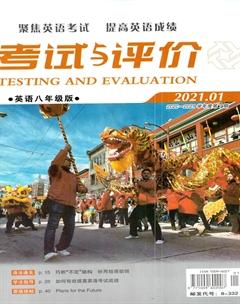情態動詞各異 should用法獨特
李天雨
同學們都知道情態動詞是用來表示語氣的單詞,但是不能獨立作謂語,只能和動詞原形一起構成謂語。我們初中階段常用的情態動詞有:can, could, may, might, must, need, ought to, dare, shall, should, will, would等。今天我們只學習情態動詞should。
一、should的用法
should作為情態動詞與其余的情態動詞一樣,可用于各種人稱,不隨主語人稱、數和時態的變化而變化,且后面永遠跟動詞原形。情態動詞should主要有以下幾種用法。
1. should用于第一人稱時可以表示說話人的一種謙遜、客氣、委婉的語氣。
I should think it would be better to try it again. 我倒是認為最好再試一試。
You are mistaken, I should say. 依我看,你是搞錯了。
2. 表示勸告或者建議,此時相當于had better,意為“應該”。
You should lie down and have a rest. 你應該躺下休息一會兒。
=Youd better lie down and have a rest.
We should study hard. 我們應該努力學習。
注意:should, ought to可通用,但在疑問句中常用should。
You should / ought to go to class right away. 你應該馬上去上課。
3. 表示義務、責任。
As a student, you should work hard. 作為一名學生,你應當努力學習。
You should take good care of your parents. 你應該照顧好你的父母。
拓展:“ should+have+過去分詞”結構一般表示義務,表示應該做到而實際上沒有做到,并包含一種埋怨、責備的口氣。
She should have finished it. 她本應該完成的。
I should have helped her, but I never could. 我本應該幫助她,但我永遠也幫不了她。
4. 表示命令和要求,此時語氣比較強烈。
You should complete your work on time. 你應該按時完成工作。
拓展:shouldnt帶有命令的色彩,意為“不許”。
You shouldnt be so careless. 你不應該這么粗心。
You shouldnt talk in class. 你不許在課堂上講話。
注意:ought to比should語氣重一些,感情也比較強烈。
I should help her because she is in trouble. 我應該幫她,因為她有麻煩了。
You ought to take care of the baby. 你應該好好照顧孩子。
5. 表示預測或可能性。
The man in the white coat should be a doctor. 那個穿白大褂的人應該是醫生。
He should be a teacher. 他應該是一名老師。
拓展:(1) ought to表示客觀推測,must表示主觀推測。
He must be home by now. 他現在一定已經到家了。(斷定他已到家)
He ought to / should be home by now. 他現在應該到家了。(不太肯定)
(2) should還可以用在if引導的條件從句中,表示一件事聽起來可能性很小,但也不是完全沒有可能,相當于“萬一”的意思。
Ask her to ring me up if you should see her. 你萬一見到她,請讓她給我打個電話。
If you should change your mind, please let us know. 萬一你改變主意,請通知我們。
6. 表示說話人的情感,如驚奇、憤怒或失望等,常用于特殊疑問句中。
What should I do? 我該怎么辦?
Why should I go? 為什么是我去?
拓展:Why / How+should結構表示說話人對某事不能理解,感到意外、驚異等意思,意為“竟會”。
Why should you be so late today? 你今天怎么來得這么晚?
—Where is Betty living? 貝蒂住在哪里?
—How should I know? 我怎么會知道呢?
二、should的基本句式
1. 肯定句:主語+should+動詞原形+其他成分
I should say sorry. 我應該說對不起。
They should eat a lot of vegetables. 他們應該吃大量的蔬菜。
“should+動詞原形”是句子的整個謂語動詞部分。
2. 否定句:主語+should+not+動詞原形+其他成分
You shouldnt smoke in the hospital. 你不應該在醫院里面抽煙。
You shouldnt eat anything now. 現在你不應該吃任何東西。
should的否定是在其后加上not,縮寫成shouldnt,再在其后加上動詞原形和其他成分。
3. 一般疑問句:should +主語+動詞原形+其他成分
肯定答語:Yes, 主語+should
否定答語:No, 主語+shouldnt
Should I go there right now? 我應該馬上去那里嗎?
—Its raining hard. Should we drive slowly? 雨下得很大。我們應該開慢點兒嗎?
—Yes, we should. 是的,我們應該這樣做。
should的一般疑問句是將should提前,且首字母大寫。后面的句子按照一般陳述句的語序接在should的后面,并且把句號改為問號。
4. 特殊疑問句:特殊疑問詞+should引導的一般疑問句
What should I do? 我應該做什么?
How long should I do it? 我應該做多久?
5. 反意疑問句:陳述句+簡單的疑問句
We should try to save water, shouldnt we? 我們應該節約用水,不是嗎?
He had been to Japan for several times, and he should be in Tokyo now, shouldnt he? 他去過日本很多次了,他現在應該在東京,不是嗎?
含有情態動詞ought to的反意疑問句,陳述部分是肯定的,疑問部分用shouldnt / oughtnt+主語。
We ought to help each other, oughtnt / shouldnt we? 我們應該互相幫助,不是嗎?
并列復合句疑問部分,謂語動詞根據鄰近從句的謂語而定。
拓展:一些經常用來提建議或征求對方意見的句型:
Lets go and listen to the music, shall we? 讓我們去聽音樂,好嗎?
Let us wait for you in the reading-room, will you? 我們在閱覽室等你,好嗎?
注意:Lets開頭的祈使句,后用shall we;Let us開頭的祈使句,后用will you。

